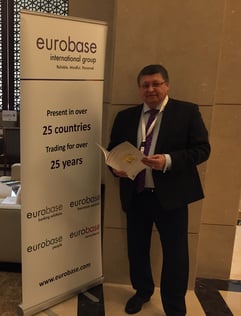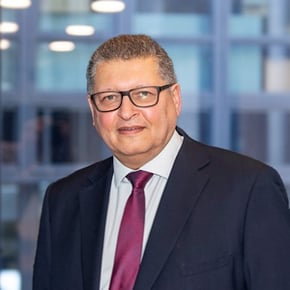
Three days in Qatar in March, high 20’s and a room full of insurance experts – what could possibly take the edge off that? How about tigers on the loose on the streets and all the Brits in the room bringing inclement weather with them… the locals were not impressed on either front!
Mult aqa in Qatar in 2016 was a slightly different affair to previous events with the organisers charging for attendance this year for the first time. Naturally, this had an impact on attendance. However, the quality of the people attending was, just like the St Regis resort where the event was hosted, first class! Clearly the excess of capital in the Middle East insurance markets didn't extend to some companies being willing to pay to attend but those who did enjoyed hearing keynote speeches from the Minister of Finance for the State of Qatar, His Excellency Ali Shareef Al Emadi and also from the Governor the Qatar Central Bank, His Excellency Sheikh Abudullah Bin Saoud Al Thani.
aqa in Qatar in 2016 was a slightly different affair to previous events with the organisers charging for attendance this year for the first time. Naturally, this had an impact on attendance. However, the quality of the people attending was, just like the St Regis resort where the event was hosted, first class! Clearly the excess of capital in the Middle East insurance markets didn't extend to some companies being willing to pay to attend but those who did enjoyed hearing keynote speeches from the Minister of Finance for the State of Qatar, His Excellency Ali Shareef Al Emadi and also from the Governor the Qatar Central Bank, His Excellency Sheikh Abudullah Bin Saoud Al Thani.
The Middle East adopts a disruptive approach
Their insights into the growing position of Qatar as a centre of insurance excellence reflected what many people, especially our aforementioned rain-soaked Brits, knew already – that the Middle East markets, with their flexible ownership and advantageous tax regimes, are a disruptive and growing market for placing risk. The MENA market is valued at US$ 50 billion* and with more and more (re)insurance firms calling it home, the Middle East is ideally placed to entice the best of the best from the world of insurance to help establish both local and international organisations employing exceptional talent and backed by major capital positions.
The old adage of “money attracts money” is just as true as other comments made in recent days; that London is far away, expensive and difficult to do business in. In a market where haggling is a national past-time, getting the best deal, and doing so in the spirit of entrepreneurialism, is second nature. Forcing people to adopt legacy processes and legacy systems isn't an option in countries where having the best and the latest of everything sets you apart from your peers. Unencumbered by these business inhibiting processes and systems, the Middle East, along with other emerging global markets, really does have the opportunity to impact the history and the legacy of the London Market’s approach.
Why other markets need to wake up
Whether you accept that it is palatable, or even acceptable, to throw money at a problem to make it go away, you can't help but marvel at the results of such an approach. There is no concept of something not being possible and where there is the expectation that customer service should mean that you can get anything you want, any time you want, (possibly with the notable exception of a Martini – the older readers of this article will get that reference…the rest of you should ask someone nearby with grey hair to sing you the old advert theme song!) then markets such as London need to wake up quickly to the opportunity that this approach presents, before it becomes a threat.
Dubai, Qatar and Bahrain amongst the many emerging Middle East countries are openly welcoming businesses to their shores; indeed there are many onshore, tax exempt, business districts offering 100% foreign ownership and favourable tax regimes. Most of the time, it's warm and sunny (hopefully we took the rain with us when we left - sorry Qatar!) and the standard of living is, for the privileged migrant workers, second to none. Naturally, there are challenges to living and working in this region but the business opportunities and the prevalent undercurrent of entrepreneurialism is rife and infectious.
The “can do” attitude here is in marked contrast to the “what’s in it for me” undercurrent in the London Market. London might well be the centre for specialist risk placement, but no-one seems to have told that to the emerging markets. If business won't come to London, then London will have to follow the business, and Lloyd’s are now present in many of these emerging market locations. In a market where the Arab Stallions (the horse variety, not the dish-dashing locals in their Ferrari’s) have grooms and stable boys to bring water to them, we should learn something from that analogy or, to finish on another, build the markets and they will come. They have and people are coming… are you?
I was delighted to meet so many of our existing clients here last week and also to meet new prospective clients. Qatar was, as always, a gracious host for this event, now celebrating its 10th anniversary. I look forward to seeing everyone again soon and to building on our success in this vibrant economic region.
*QFC 2015